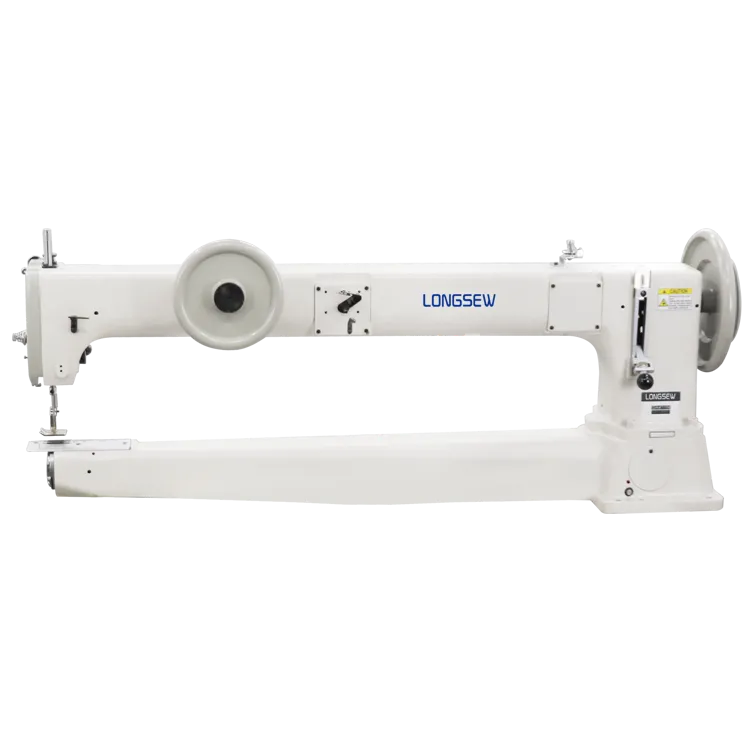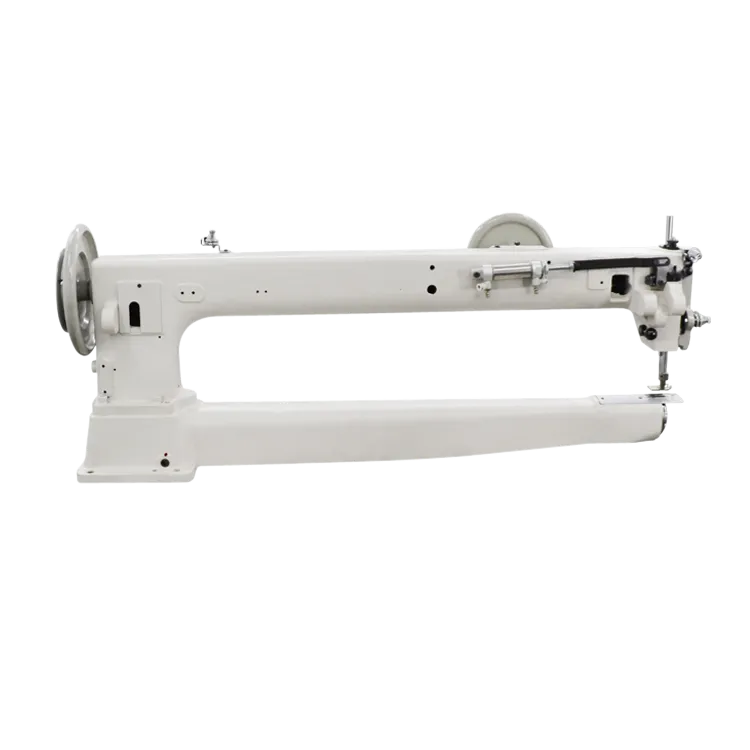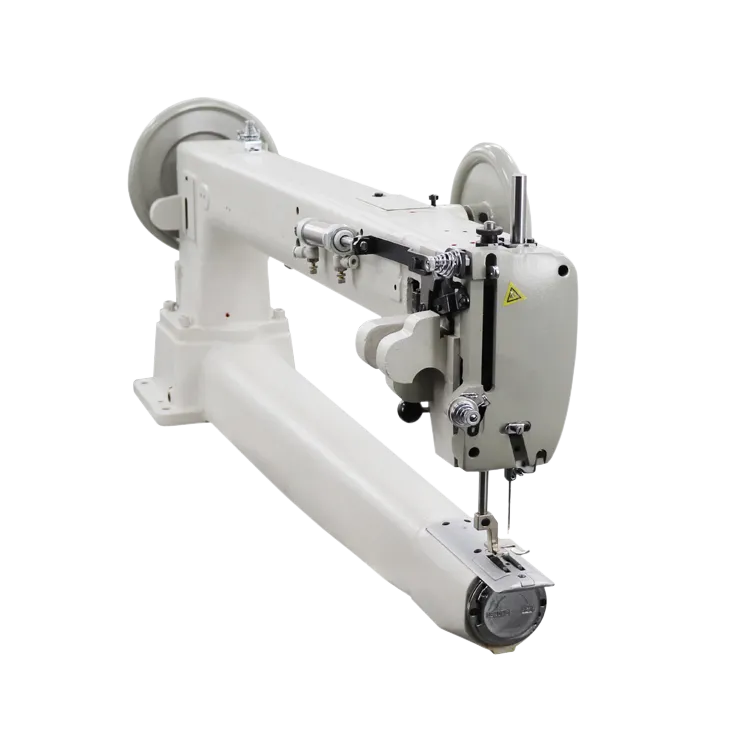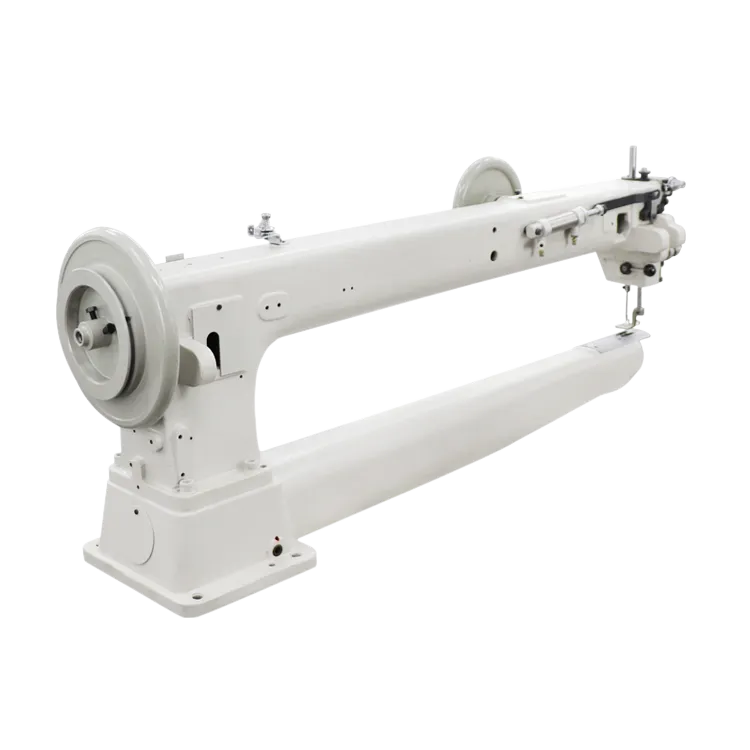Cylinder Bed Sewing Machine Price: Heavy Duty Industrial Models
Industrial Sewing Solutions: A Deep Dive into Cylinder Bed Technology
In the specialized world of industrial textile manufacturing, precision and robust performance are paramount. Among the diverse array of sewing machinery, the cylinder bed sewing machine stands out for its unique capabilities, particularly in handling three-dimensional and tubular products. This article explores the intricacies, applications, and value proposition of these essential machines, focusing on factors influencing cylinder bed sewing machine price. We'll delve into industry trends, technical specifications, application scenarios, manufacturing processes, and the overall economic considerations for B2B procurement.
Current Industry Trends and Market Demand
The demand for specialized sewing machinery, including the industrial cylinder sewing machine, is consistently high across sectors that require precision stitching on complex geometries. Key trends include increasing automation, integration of smart technologies for enhanced efficiency and data monitoring, and a growing emphasis on sustainability in manufacturing processes. The global industrial sewing machine market is projected to grow significantly, driven by expanding manufacturing industries in Asia-Pacific and rising demand for high-quality, durable goods globally. Manufacturers are continually innovating to improve machine longevity, reduce energy consumption, and offer greater versatility, making the pursuit of a reliable cylinder bed sewing machine for sale a strategic investment.
Furthermore, the customization trend in product manufacturing, from bespoke automotive interiors to specialized protective gear, fuels the need for adaptable machinery like the heavy duty cylinder arm sewing machine. These machines are critical for handling thick, multi-layered materials and intricate shapes that traditional flatbed machines cannot accommodate.
Understanding the Cylinder Bed Sewing Machine: Technical Specifications & Advantages
A cylinder bed sewing machine is characterized by its narrow, cylindrical arm, which allows operators to sew into confined or tubular areas, such as those found in footwear, bags, upholstery, and automotive components. This design is a significant departure from the flatbed configuration, offering unparalleled access for stitching inside curves and around three-dimensional objects.
Key Technical Parameters and Performance Attributes
When evaluating a typical cylinder arm sewing machine, several technical parameters are critical for assessing its suitability for specific applications. These include:
- Cylinder Diameter: Ranging from 46mm to 70mm, this determines the minimum curvature radius the machine can handle. Smaller diameters are ideal for fine leather goods and precise boot stitching.
- Stitch Length: Adjustable, typically from 1mm to 10mm, enabling versatility for various material thicknesses and aesthetic requirements.
- Presser Foot Lift: Critical for material handling, heavy-duty models often feature 10mm to 20mm, accommodating multi-layered or bulky materials.
- Sewing Speed: Ranging from 800 to 2500 RPM, balancing productivity with precision for different applications.
- Hook Type: Large capacity hooks (e.g., oscillating shuttle hook, rotary hook) reduce thread changes, increasing efficiency for long seams and thick threads.
- Motor Type: Servo motors are increasingly common due to their energy efficiency, precise speed control, and quiet operation, impacting the overall cylinder bed sewing machine price.
- Long Arm Options: Extended arm lengths (e.g., 400mm, 600mm, or even 1000mm) facilitate the sewing of larger items like tents, sails, or automotive covers, offering significant ergonomic and efficiency advantages.

Technical Advantages
- Superior Maneuverability: The cylindrical arm allows for easy manipulation of complex shapes, making it indispensable for footwear, bags, and automotive interiors.
- Heavy-Duty Capability: Many cylinder bed machines are engineered as heavy duty cylinder arm sewing machines, capable of penetrating multiple layers of dense materials like leather, canvas, and industrial fabrics with consistent stitch quality.
- Consistent Stitch Quality: Advanced feeding mechanisms (e.g., unison feed, compound feed) ensure material layers move synchronously, preventing slippage and achieving uniform, strong stitches.
- Versatility: Adaptable to various materials and thread types, from fine leather for designer goods to thick nylon for safety equipment.
- Enhanced Durability: Constructed with robust components, these machines are built for continuous industrial operation, providing a long service life and high return on investment.
The Manufacturing Process: Ensuring Quality and Performance
The robust performance and precision of an industrial cylinder sewing machine are a direct result of meticulously engineered manufacturing processes. From raw material selection to final assembly and testing, every stage adheres to stringent quality controls.
Process Flow Overview
- Material Selection: High-grade cast iron (e.g., FC250 for main body castings) and hardened steels (e.g., SCM415 for shafts, SUJ2 for bearings) are selected for their durability, wear resistance, and dimensional stability. Precision alloys are used for critical moving parts to minimize friction and ensure longevity.
-
Casting & Forging:
- Casting: Main frames, arms, and beds are typically sand-cast from high-tensile cast iron, followed by stress relief annealing to prevent deformation during machining and operation.
- Forging: High-stress components like connecting rods, gears, and shafts are hot-forged from alloy steels to achieve superior grain structure, strength, and fatigue resistance.
-
CNC Machining: Components undergo multi-axis CNC machining for precise tolerances (e.g., ±0.005mm for critical fits), ensuring perfect alignment and smooth operation. This includes milling, turning, grinding, and boring of holes for shafts and bearings.

- Heat Treatment & Surface Finishing: Critical parts are subjected to various heat treatments (e.g., carburizing, quenching, tempering) to achieve specific hardness profiles. Surface finishes like chrome plating, black oxide, or specialized coatings are applied for corrosion resistance, reduced friction, and enhanced wear characteristics, directly impacting the machine's service life.
- Precision Assembly: Skilled technicians meticulously assemble hundreds of components, ensuring proper clearances, lubrication, and adjustments. Advanced diagnostic tools are used to verify mechanical and electronic integrity.
-
Testing & Quality Control: Every machine undergoes rigorous functional testing to meet international standards such as ISO 9001 for quality management. This includes:
- Durability Testing: Continuous operation under load for extended periods.
- Stitch Quality Analysis: Evaluation across various materials and speeds to ensure consistent, defect-free seams.
- Noise and Vibration Analysis: To ensure operator comfort and machine stability.
- Safety Compliance: Adherence to relevant safety standards (e.g., CE marking for European markets, ANSI for North America).
Service Life and Target Industries
A well-maintained heavy duty cylinder arm sewing machine manufactured to these standards can have a service life exceeding 15-20 years in industrial settings. Its robust construction ensures minimal downtime and consistent performance over its operational lifespan.
Target industries include:
- Footwear Manufacturing: Boots, shoes, slippers (especially for sewing uppers and soles).
- Leather Goods: Handbags, wallets, belts, luggage, saddlery, equestrian equipment.
- Automotive & Marine: Upholstery, car seats, boat covers, convertible tops.
- Outdoor & Sporting Goods: Tents, awnings, backpacks, sleeping bags, sports equipment.
- Technical Textiles: Filtration products, safety harnesses, straps, belts.
- Apparel (Specialty): Jeans, jackets, workwear with heavy seams, hats, caps.
These machines offer significant advantages such as energy saving through efficient servo motors, corrosion resistance from advanced material treatments, and exceptional durability, making the initial cylinder bed sewing machine price a long-term investment in operational efficiency and product quality.
Application Scenarios & Real-World Impact
The versatility of the cylinder arm sewing machine extends across a multitude of manufacturing sectors, solving specific challenges where flatbed machines fall short. Its capability to access challenging geometries makes it indispensable.
Practical Usage Scenarios
- Footwear Production: A leading boot manufacturer utilized a heavy-duty cylinder arm sewing machine to attach soles to boot uppers. The narrow cylinder allowed precise stitching around the curved last, significantly reducing manual effort and improving stitch consistency by 30%.
- Luxury Leather Goods: A high-end handbag maker uses leather cylinder arm sewing machine models for crafting cylindrical sections of bags and inserting zippers into curved openings, achieving flawless seams that uphold their brand's quality reputation.
- Automotive Upholstery: In the automotive industry, these machines are essential for stitching intricate curves on car seats and dashboards, especially around headrests and armrests, ensuring a snug fit and professional finish.
- Saddlery and Harnesses: For equestrian equipment, the strength and reach of an industrial cylinder sewing machine are critical for assembling durable saddles, bridles, and harnesses from thick leather.

Customer Feedback and Service Case Studies
"Our investment in the Long Arm Heavy Duty Cylinder Bed machine drastically cut down the production time for our long barrel boots," states John D., Production Manager at a major footwear company. "The consistent stitch quality and ability to reach deep into the boot shaft were game-changers. The initial cylinder bed sewing machine price was justified by the immediate efficiency gains."
Another case involved a custom leather goods workshop. Facing challenges with precise stitching on cylindrical bag components, they adopted a specialized leather cylinder arm sewing machine. Within three months, they reported a 20% reduction in material waste due to fewer reworks and a significant improvement in product finishing, directly enhancing their brand reputation and customer satisfaction. The long-term reliability and minimal maintenance requirements of these machines also translate into lower total cost of ownership, making a strong case for their value.
Vendor Comparison & Customization Options
The market for industrial sewing machines is diverse, with various manufacturers offering different models and configurations. Understanding the factors that influence cylinder bed sewing machine price and choosing the right vendor is crucial for a successful procurement.
Factors Influencing Vendor Choice and Pricing
- Brand Reputation and History: Established manufacturers with decades of experience often command a higher cylinder bed sewing machine price but offer proven reliability, extensive R&D, and robust support networks.
- Technological Innovation: Vendors incorporating advanced features like direct-drive servo motors, automatic thread trimming, programmable patterns, and IoT connectivity provide higher value and efficiency, impacting cost.
- Material and Component Quality: As discussed in the manufacturing process, the grade of steel, castings, and electronic components directly correlates with machine longevity and performance, influencing the overall heavy duty cylinder arm sewing machine price.
- After-Sales Support & Warranty: Comprehensive warranty policies, readily available spare parts, and responsive technical support are critical considerations that add long-term value.
- Certifications: Look for manufacturers with ISO 9001 (Quality Management), CE (European conformity), and other relevant industry certifications, indicating adherence to international quality and safety standards.
Customized Solutions
Many B2B buyers require bespoke solutions to address unique production challenges. Reputable vendors often provide customization options, including:
- Specialized Cylindrical Arm Lengths or Diameters: Tailored for specific product sizes or access requirements.
- Modified Feeding Mechanisms: To handle unusually slippery, sticky, or extremely thick materials.
- Integrated Automation: Such as robotic material handling systems or automated pattern recognition for complex stitching.
- Custom Presser Feet and Plates: Designed for unique material contours or decorative stitching.
- Software Integration: For connection to existing MES (Manufacturing Execution Systems) or ERP (Enterprise Resource Planning) platforms.
These customizations can affect the overall cylinder bed sewing machine price but often provide a significant return on investment through increased efficiency, higher quality output, and reduced labor costs for highly specialized tasks.
Product Spotlight: Long Arm Heavy Duty Cylinder Bed Horizontal Direction Sewing Machine GA411N
The Long Arm Heavy Duty Cylinder Bed Horizontal Direction Sewing Machine GA411N exemplifies advanced engineering for specialized industrial applications. Designed specifically for long barrel products such as boots, filter bags, and other deep tubular items, this machine offers exceptional reach and power.
Key Specifications and Features
| Parameter | Specification (GA411N) |
|---|---|
| Product Name | Long Arm Heavy Duty Cylinder Bed Horizontal Direction Sewing Machine For Like Boot Long Barrel Products GA411N |
| Cylinder Diameter | ~46-50 mm (optimized for boot/barrel products) |
| Arm Length (Working Space) | ~400 mm (Long Arm) |
| Max. Stitch Length | Up to 10 mm |
| Presser Foot Lift | 16 mm (by knee lever) |
| Max. Sewing Speed | 2000 RPM (Material Dependent) |
| Hook Type | Large capacity oscillating shuttle hook |
| Feeding Mechanism | Compound feed (Unison feed) |
| Needle System | DPx17, sizes #18 to #26 |
| Motor | Energy-saving servo motor (optional) |
| Applications | Boots, long barrel products, leather goods, bags, auto upholstery, technical textiles. |
The GA411N represents a pinnacle in long arm heavy duty cylinder arm sewing machine technology, offering industrial manufacturers a powerful tool for enhanced productivity and superior stitch quality on challenging projects. The precision engineering and robust construction ensure a long operational life, making the investment worthwhile when considering the long-term cylinder bed sewing machine price versus its performance benefits.

Ensuring Trust: Lead Time, Warranty & Support
Beyond the initial cylinder bed sewing machine price, a buyer's trust is built upon the vendor's commitment to reliability, transparency, and ongoing support.
Lead Time and Fulfillment
Typical lead times for standard models of an industrial cylinder sewing machine range from 4-6 weeks, depending on stock availability and order volume. Customized configurations may extend this to 8-12 weeks due to specialized manufacturing and testing requirements. Reputable vendors maintain clear communication throughout the order fulfillment process, providing estimated delivery dates and tracking information. Expedited shipping options are often available for urgent requirements, though these may incur additional costs.
Warranty Commitments
Most industrial cylinder bed sewing machines come with a standard 12-month warranty covering manufacturing defects and critical components. Extended warranty options may be available for an additional investment, providing peace of mind for long-term operational plans. It is crucial for buyers to understand the terms and conditions, including what is covered (e.g., mechanical parts, electrical components) and what might void the warranty (e.g., unauthorized modifications, improper maintenance).
Customer Support and After-Sales Service
Comprehensive after-sales support is a hallmark of a reliable vendor. This typically includes:
- Technical Support: Via phone, email, or online portals, often with multi-language capabilities.
- Spare Parts Availability: A readily accessible inventory of genuine spare parts minimizes downtime.
- On-site Training and Installation: For complex machines or large-scale deployments.
- Maintenance Schedules and Guides: To ensure optimal performance and prolong machine life.
- Service Network: Access to authorized service centers or technicians for repairs and preventative maintenance.
Investing in a strong after-sales support package can significantly reduce operational risks and maximize the return on your industrial cylinder sewing machine investment.
Frequently Asked Questions (FAQ)
Q: What is the primary advantage of a cylinder bed sewing machine over a flatbed?
A: The main advantage is its ability to sew into confined, tubular, or three-dimensional shapes that are difficult or impossible to maneuver on a flatbed machine. This includes items like boots, bags, caps, and cuffs. The cylindrical arm provides superior access and control for such applications.
Q: How does the "heavy duty" designation impact the cylinder bed sewing machine price?
A: Heavy-duty models are built with more robust components, stronger motors, and specialized feeding mechanisms designed to handle thicker materials (e.g., multiple layers of leather, heavy canvas) and thicker threads. This increased engineering and material strength contributes to a higher initial cylinder bed sewing machine price but offers greater durability, power, and longevity for demanding applications.
Q: Can a leather cylinder arm sewing machine be used for other materials?
A: While optimized for leather, many models are versatile enough to handle other heavy materials like canvas, denim, webbing, and various technical textiles. The key is adjusting needle type, thread tension, and presser foot pressure according to the material. Always consult the machine's specifications for recommended material types.
Q: What should I consider when evaluating a cylinder bed sewing machine for sale?
A: Key considerations include the specific applications (material types, product shapes), required stitch length and speed, cylinder arm diameter and length, motor type (servo vs. clutch), available feeding mechanisms (e.g., compound feed for difficult materials), brand reputation, warranty, and after-sales support. Balancing these factors against your budget will help determine the best value.
Conclusion
The industrial cylinder sewing machine is an indispensable asset for manufacturers working with complex, three-dimensional, or tubular products. Its specialized design offers unparalleled access, precision, and the capability to handle heavy-duty materials with consistent stitch quality. While the cylinder bed sewing machine price is an important factor, the long-term value derived from enhanced productivity, reduced rework, and prolonged service life makes it a strategic investment for businesses in footwear, leather goods, automotive, and other specialized textile industries. By understanding the detailed manufacturing process, technical specifications, customization options, and robust after-sales support, B2B decision-makers can make informed choices that optimize their operational efficiency and product quality for years to come.
References
- ISO 9001:2015 Quality management systems – Requirements. International Organization for Standardization.
- ASTM D6193-11: Standard Practice for Seams and Stitches Used in Home Furnishings. ASTM International.
- European Committee for Standardization. EN ISO 20345: Personal protective equipment – Safety footwear.
- Market Research Future. (2023). Industrial Sewing Machine Market Research Report – Global Forecast till 2030.
- ASM Handbook, Volume 15: Casting. ASM International.
- ASM Handbook, Volume 14A: Metalworking: Bulk Forming. ASM International.
-
Boost Production Efficiency with a Pattern Sewing MachineNewsAug.29,2025
-
Industrial Excellence with the Best Heavy Duty Sewing MachineNewsAug.29,2025
-
Precision and Power with the Best Pattern Sewing MachineNewsAug.29,2025
-
Reliable Bulk Packaging Starts With the Right FIBC Sewing MachineNewsAug.29,2025
-
Advanced Packaging Solutions: Elevate Productivity with Jumbo Bag Sewing Machine and Industrial Stitching EquipmentNewsAug.29,2025
-
High-Performance Solutions for Bulk Packaging: FIBC Sewing Machine and MoreNewsAug.29,2025
-
Maximize Efficiency with an Industrial Cylinder Arm Sewing MachineNewsAug.28,2025


























